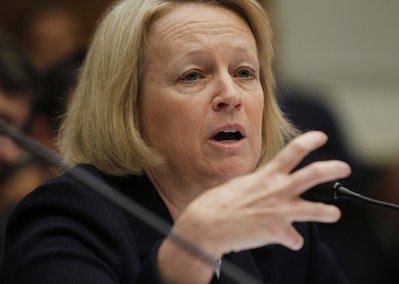World Business
SEC chief pledges better oversight of banks
(Agencies)
Updated: 2010-04-21 09:59
 |
Large Medium Small |
WASHINGTON: The chairman of the Securities and Exchange Commission (SEC) on Tuesday pledged better oversight of the United State's largest banks after criticism that the agency failed to spot accounting tricks at investment bank Lehman Brothers before it collapsed.
Chairwoman Mary Schapiro told a congressional panel that the agency has sent letters to 19 banks seeking information about whether they are using accounting tricks that a bankruptcy examiner said masked the bank's precarious financial condition. Lehman failed in September 2008 in the largest corporate bankruptcy in US history.
|
 |
|
SEC Chairwoman Mary Schapiro testifies before the House Financial Services on April 20. [Agencies] |
Schapiro, who was not with the SEC at the time, said the agency is scrutinizing Lehman's use of the accounting move, known as Repo 105, that allowed it to mask its weakness.
Her testimony follows widespread criticism that the SEC failed to properly monitor Wall Street ahead of the Great Recession, and after the agency filed civil fraud charges on April 16 against Goldman Sachs.
Tuesday's hearing examining what led to Lehman's meltdown drew lawmakers into a partisan squabble over the Obama administration's push for financial regulatory reform. Republicans pointed to the track records of the SEC and other agencies as evidence that more regulation won't prevent future meltdowns.
Lehman's collapse was the biggest corporate bankruptcy in US history and threw global financial markets into crisis. The hearing looked at the bankruptcy examiner's report, which said the firm masked $50 billion in debt.
|
||||
"It's not clear any action by the SEC could have saved Lehman Brothers, but we are determined to use the lessons of that experience to be more effective," Schapiro said. "More vigorous oversight and a new approach are essential."
Richard Fuld, Lehman's former CEO, said he has "absolutely no recollection whatsoever" of any documents related to the so-called Repo 105 accounting maneuver. After reviewing the transactions, he said the firm complied with accounting standards.
Fuld expressed regret about the company's collapse.
"One day we had a firm," he said. "The next day we did not. A lot of people got hurt by that, and I have to live with that."













